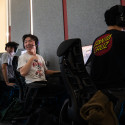Schools Get A Garden-Variety Education
On a sun-kissed but blustery spring day, 83-year-old Francis Hole sings songs and tells the story of the soil, how it came to be and why — without it — humans would never have amounted to anything.
It is a routine that Hole has performed many times. As one of the UW–Madison’s most popular former teachers, and as a sought-after guest lecturer, Hole uses his battered violin, soil auger and suitcase full of puppets to great effect. Today, his audience of 80 children, clustered around an unremarkable patch of dirt behind Madison’s Mendota Elementary School, takes a special interest in his performance because they, too, have a stake in the soil.
 A late wintry blast didn't stop Mendota Elementary School students from listening to the stories of Francis Hole, who is helping the school start a garden on its grounds. |
Using a 6-foot-by-100-foot plot within a short bounce pass of the school’s basketball court, the children and teachers of Mendota Elementary have embarked on a pilot project in science education that promises a harvest of insight into the process and outcomes of science.
The project, known as the SEED Program (for Science, Education, Employment and Development), is being nurtured by the UW–Madison Center for Biology Education (CBE). The urban garden model is a simple but effective way to provide a year-round, hands-on learning experience for young people, according to CBE Outreach Specialist José Rios.
The Mendota School project grew from the efforts of Cheryl Wade, now an associate outreach specialist at CBE who in 1991 founded the Gardening Angels, a forerunner to the Mendota project. She started the Mendota project in 1995 with support from the Madison Community Foundation, the National Gardening Association and the Wisconsin Food System Partnership, which now supports the SEED Program.
The garden is a vehicle for teaching children – and their teachers – about science and nutrition, says Rios, who directs the SEED Program. Moreover, the project serves as a model that can be exported to other schools and organizations and will soon be in place at Madison’s Sherman Middle School, East High School and in Project Ujima, a family counseling program on Madison’s south side.
This year, more than 120 Mendota students have signed up to take turns preparing the ground, planting, cultivating, weeding and harvesting. In return, they achieve a sense of accomplishment, an enhanced view of science and how it bears on the real world, a sense of community and, importantly, the chance to foray into the garden for fruit and vegetable snacks. While the project currently includes third and fourth graders, Rios and Wade hope to eventually involve all classes.
“The idea behind it is to find a focal point that is simple, but has lots of things that can spin off of it,” explains Rios. A garden, he says, provides a means of learning more than simple horticulture; it is a living lab where concepts of biology, chemistry and the physical sciences can come alive for students. Last year, Rios says, the students had a plant sale, giving them the chance to incorporate business and math into the project’s curriculum. Engaging teachers in the project, he says, gets them to participate in other kinds of biology-based professional development.
Perhaps equally important, says Rios, is the garden’s ability to bring the community together. The project involves not only the school, but the nearby Vera Court Community Center, UW–Madison faculty, staff and students, parents and other community members. The long-term success of the project, in fact, depends on the involvement of others because much of the gardening needs to be done after school or during the summer.
That involvement has led to a sense of ownership – a spirit, Rios says, that is reflected in a decrease in vandalism, which was a big problem in the project’s early days.
The SEED Program is seeking faculty, staff and student volunteers to help with the project. Contact Rios at 265-2125 or by e-mail at jrios@facstaff.wisc.edu.
Tags: learning



